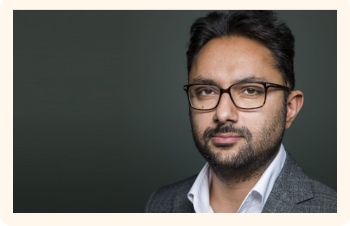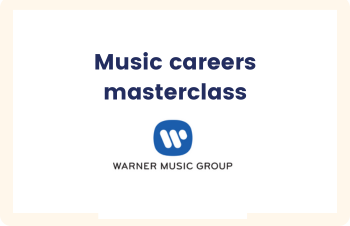For Creative Access’ latest masterclass, Warner Music UK hosted a stellar panel of speakers working in different arms of the organisation to discuss the rich variety of roles on offer behind-the-scenes in the music industry.
Our chair Jeremiah Gogo is the head of data & A&R analytics at Atlantic. He delivers research and analysis projects to help inform marketing, A&R and streaming decisions.
Arina Logacheva is the senior A&R Manager at Parlophone. She was previously the first female A&R at Sony Publishing Scandinavia.
Maláika Carr-Haji is a marketing manager, Warner Records, where she has worked since 2019. Maláika is also a content creator and tastemaker.
Priya Jaspal is the head of streaming & digital at Warner’s distribution arm, ADA, working across multiple platforms including Spotify and TikTok.
Rotimi Skyers is digital and marketing at Warner Music Group’s Rhino label and formerly he was at Universal Music Group.
Different paths – how can you land a role in the industry?
When asked about how they got into the industry, each of our panellists had differing career journeys but agreed that networking and demonstrating your passion for music will get you far. Both Jeremiah and Priya went down the more ‘traditional’ routes of getting internships at record labels (coincidentally – both at Universal at around the same time!) and then worked their way up from there. Jeremiah and Priya emphasised the importance of being ‘in the room’ and embracing every opportunity you’re given. Priya built on this to explain: “Put your hand up to every task. Learn and do as much as you can. Spot gaps in what you think people need – how can you make somebody’s life easier?”
Meanwhile, Arina has been in the industry for 10 years and said she had spent time volunteering at music festivals, working in radio and taking part in mentoring programmes, before getting told her opinionated nature would be perfect in an A&R role. She said that if you want to work in A&R, the best thing to do is start yourself: this could look like going out there and managing an artist or putting on club nights. “You need to speak the same language as the artist”, she says. The most important part of being in A&R is being able to connect with people at every different level.
Both Maláika and Rotimi didn’t start off working in the music industry at all. Maláika had always worked in retail, but she spent time outside of work talking about music online and establishing herself as a tastemaker. This led to her applying for an internship at Warner, and despite not having the ‘work experience’, her passion for music meant she was offered an assistant role instead. She advised to think about what you’re currently doing that shows you actually have an interest in the industry you’re coming into. “When I turned up for my internship interview, I spoke about things I was currently doing – I had a playlist, I was on a show on Linkup TV, I was also trying to get a show on Rinse FM – even though my CV was just retail and I don’t have a degree, the things I was doing in music were what got me the job,” she said.
Rotimi who studied architecture at university, stated that he “didn’t take the standard path”, explaining that he did “everything under the sun” from working at McDonalds, to carpentry, to doing exhibitions. He then fell into his data analyst role and applied for an internship at Universal. Similarly to Maláika, they said he was applying for the wrong job and they offered him a job in digital marketing instead proving the importance of putting yourself forward for opportunities even if you might not be considered the right “fit”. Rotimi explained that it is vital that if you haven’t got the experience, do your research before an interview: “You get one shot, go for it”.
Researching your role and the industry is something Jeremiah agrees with. He says that you should “get to know the tools that the industry is using”, stating that in data, Chart Metric is a great tool, sign up for a free trial and play around. This can help you stand out amongst other candidates.

“It all comes down to the human element” – what’s it like working in music?
Our speakers all agreed that data and new technology such as streaming and TikTok is playing a huge part in the ever-changing landscape of the industry. Jeremiah and Arina noted how important data is for A&R and marketing, but they insisted that while data helps, you still need to use your gut and emotional intelligence to discover new artists and get the deal signed.
As for marketing artists now with the rise of TikTok, Maláika explained that whilst there is an over-saturation of new music and you’re competing for everyone’s attention, her job is to “champion the artist and their story, and their music”. For example, with Pa Salieu, Coventry was integral to his campaign and she had to ensure that came across, as well as ensuring that they used photographers and videographers who could capture black skin. “We work in a business, but we work with artists every day. Once they’re at a place where their happy to bring out music, my job is to support them in any way I can,” she said.
Like Jeremiah’s role, Priya’s job is pretty new and only came about in 2014 post the growth of streaming. While she’s aware that people don’t really understand what her job is, she describes its 3 different pillars:
- Sales pitch – trying to sell the artists to Spotify, telling the story in an authentic way and getting them on playlists
- Marketing – pitching for billboards and campaigns
- Data – you don’t have to be a data expert but you need to understand trends in data and think about what the artist needs in their campaign to feed into their streaming story
She explains that her role bleeds into data and marketing, highlighting the collaborative nature of working in the music industry. Similarly to Maláika’s story about Pa Salieu and the importance of understanding your artist, when Priya led streaming on Central Cee she stated that it “all comes down to the human element”. She went on to say, “we have to lean into what he wants and just advise him on what’s currently happening in the industry.”
Rotimi works on historical artists: his job is to repackage and retell these stories. Much like Maláika and Priya, he says that the “beautiful” part of his job is to “make sure the stories are still being told with love and care”. He works on everything from big artists like David Bowie’s catalogue, to Kate Bush’s syncing with Strangers Things, to Warner’s Black British catalogue who weren’t supported enough in the first run, explaining that now he can give these hidden gems a second life.
What challenges have you faced in your career?
As with any job, there are challenges. Maláika explains that being from an under-represented background in music can be difficult at times: “There’s being a woman, there’s being a Black woman. Also depending on your class, that factors in.” She states that it’s harder as a junior being around men as “your voice might not be heard”, but she highlights the importance of seeing female role models in leadership positions in giving you hope of what you can achieve.
Rotimi said: “Being Black and where I’m from, you get pigeon-holed because you’re in an office with people who aren’t like you.” He continued that he’s had people question his vocabulary, but he advised the importance of utilising your knowledge and recommended networking – “there will be people in the building who can relate to you”. This partners with Maláika’s advice of finding the power of your voice and knowing the importance of it so that no matter what room you’re in, you’re adding value.
Overall, our panel agreed that in the music industry you have to have confidence in your own opinion and trust yourself, but that this can be built upon simply by having a passion and love for music and telling stories.
A massive thanks to our panel for their honesty, advice and for sharing their inspirational career journeys with us. Keep an eye out for details on our next masterclass on 5th December 2022 which is being hosted by the Financial Times!




